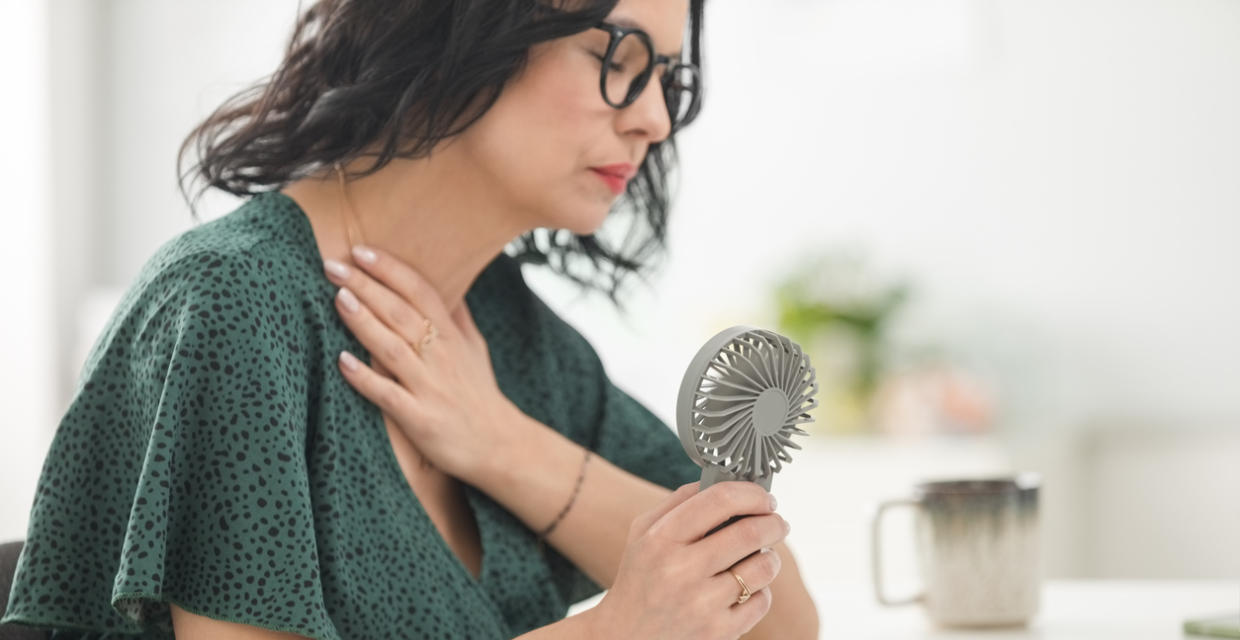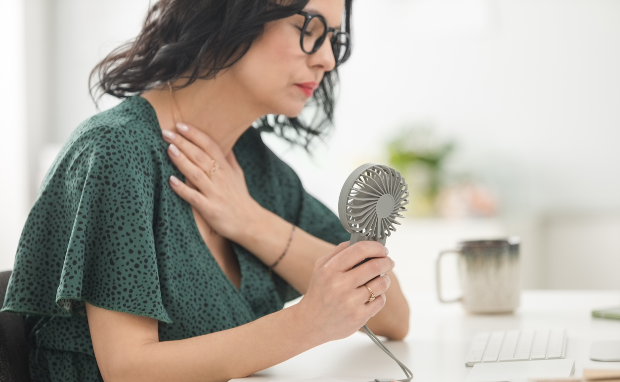Key Points
- Estrogen naturally declines during menopause, bringing hot flashes, mood changes, and the risk of bone loss
- No foods can boost estrogen levels dramatically, but certain plant compounds may provide support to help manage symptoms
- Phytoestrogen-rich foods and specific vitamins and minerals, like Calcium and Vitamin D, are important
Estrogen does so much more than manage your monthly cycle. This powerhouse hormone is your ally for bone density, heart health, mood stability, and even cognitive function.
Yet as menopause approaches, estrogen production takes a nosedive, leaving many women struggling with a host of unpleasant symptoms.
According to physician, Gia Eapen, MD, "One of the major causes of low estrogen in women is menopause, which typically occurs between ages 45-55. During this natural transition, the ovaries gradually produce less estrogen, leading to significant hormonal changes that affect multiple body systems, including bone health and mood regulation."
Unfortunately, there are no foods to replace the estrogen levels your body produces naturally. However, research suggests that specific nutrients and plant compounds may offer gentle support during this hormonal shift.
Symptoms of low estrogen
Rebecca Blake, RD, Registered Dietitian, explains: "Low estrogen symptoms include night sweats and hot flashes, irregular periods, changes in skin elasticity and tone, changes in vaginal and labial tissue, as well as changes in mood."
Beyond hot flashes and mood changes, menopause can feel like your brain is wrapped in cotton. Many women experience brain fog, that frustrating inability to find the right word or remember why they walked into a room. Menopause weight gain is also typical.
Apart from all this, sleep disturbances affect 40-60% of all menopausal women, turning what should be restorative rest into nightly battles with insomnia. It’s no wonder menopause can feel overwhelming.
While these symptoms can be challenging, certain natural approaches may help reduce their severity.
Managing low estrogen levels naturally
While foods cannot dramatically increase estrogen, the right nutrition strategy can help manage symptoms during hormonal transitions.
For example, studies show that a Mediterranean diet—rich in fruits, vegetables, whole grains, olive oil, nuts, and fish—may reduce both the frequency and severity of hot flashes. Some research suggests that a low-fat vegan diet can lower hot flash episodes.
Beyond these diets, here are specific foods that may help you manage menopause symptoms naturally.
Here are some foods that can help you manage menopause symptoms naturally.
1. Phytoestrogens
Phytoestrogens are plant nutrients that can mimic estrogen and potentially ease symptoms.
Keep in mind, however, that phytoestrogens are significantly weaker than natural estrogen. One study estimates that they are 100 to 100,000 times weaker than estrogen.
Phytoestrogens are found in:
Soy products
Soy products like tofu, tempeh, edamame, and soy milk in your diet have high levels of isoflavones (a type of phytoestrogen).
In one 3-month study, participants eating plant-based, low-fat meals plus a half-cup serving of cooked soybeans each day reported 84% fewer moderate to severe hot flashes.
Blake, RD notes: "A diet high in soy isoflavones can help reduce night sweats and hot flashes. Research suggests that cultures that have diets high in soy report less frequency and severity in those symptoms. Supplementing with soy isoflavones can reduce symptoms as well. I always recommend talking to your doctor or a registered dietitian about supplements and ensuring you are buying a reputable brand."
Flaxseeds
Flaxseeds offer lignans, naturally occurring phytoestrogens that may assist in hormone regulation. Additionally, they supply essential omega-3s and fiber content that can be particularly beneficial for women navigating menopausal changes.
Legumes
Legumes like chickpeas, lentils, and beans contain moderate amounts of isoflavones plus excellent protein and fiber. Legumes can be incorporated as part of a broader Mediterranean-style diet.
2. Calcium and Vitamin D
When estrogen drops during perimenopause and menopause, your bones pay the price. Low estrogen levels are linked to bone loss and conditions like osteoporosis.
Here’s how dramatic bone loss during menopause can be:
- Women typically experience a bone mineral density loss of 1.8-2.3% annually in their spine and 1.0-1.4% in their hips during this time.
- If this pattern continues for five years, a woman could lose nearly 7-10% in their spine and 5-7% in their hip. This loss can make fractures 50-100% more likely to occur.
The good news is that proper nutrition may help. Studies suggest that calcium supplements may reduce the rate of bone loss in menopausal women. This is especially important when dietary intake falls short.
Calcium alone isn't enough; it needs vitamin D for proper absorption.
“Calcium provides the building blocks for bone tissue, while vitamin D ensures your body can actually absorb and utilize that calcium effectively,” explains Eapen, MD.
Good sources of calcium include:
- Dairy products (milk, yogurt, cheese)
- Green leafy vegetables (kale, collard greens, bok choy)
- Canned sardines and salmon with bones
- Almonds and sesame seeds
- Fortified plant-based milk alternatives
Sources of vitamin D in your diet include:
- Fatty fish (salmon, mackerel, sardines)
- Egg yolks
- Fortified foods
- Cod liver oil
3. Vitamin B
B vitamins like B6 and B12 play supporting roles in hormone production, but don't expect them to raise estrogen on their own dramatically. What they do well is help balance other hormones and support bodily systems that struggle when estrogen drops during menopause.
You can find vitamin B in:
- Leafy greens such as spinach, collard greens, and turnip greens
- Eggs
- Fish such as salmon and trout
- Whole grains
4. Boron
Boron can influence steroid hormone production and help prevent calcium loss. You can find this mineral in:
- Nuts (especially almonds and walnuts)
- Dried fruits (prunes, raisins, dates)
- Avocados
5. Vitamin E
Vitamin E may be another ally in the fight against menopausal symptoms. While some studies suggest it may help reduce hot flashes in postmenopausal women, more research is needed to know for sure.
Before taking Vitamin E supplements, please discuss options with your healthcare provider to evaluate whether it fits your health needs.
Final thoughts: How to increase estrogen naturally
While no single food can dramatically boost estrogen levels, some nutritional strategies offer real support during perimenopause and menopause.
The secret lies in weaving specific dietary patterns, like the Mediterranean diet or another largely plant-based diet, with phytoestrogen-rich foods, hormone-supporting vitamins, and bone-protective nutrients.
Remember that diet will need to be accompanied by regular exercise (including strength training to reduce bone loss), stress management, adequate sleep, and professional medical guidance.
No two women experience menopause the same way, so professional guidance can be very helpful. Doctors specializing in women's health can help create an individualized plan. A registered dietitian can personalize a targeted nutrition strategy and offer ongoing support.
Manage menopause symptoms naturally. Get a personalized menopause diet plan, covered by insurance.
Frequently asked questions (FAQs)
1. What foods raise estrogen levels?
“There are no foods that are scientifically correlated to a direct increase in estrogen levels. There is no harm in including foods that are high in phytoestrogens (such as soy, flaxseeds, and tempeh), and you may even see some reduction in vasomotor symptoms,” notes Blake, RD.
Vasomotor symptoms of menopause include hot flashes and night sweats.
Phytoestrogen-rich foods like soy products, flaxseeds, and legumes may help reduce symptoms associated with low estrogen by providing plant compounds that mimic some of estrogen's effects in the body.
2. What is the fastest way to increase estrogen?
There is no truly "fast" natural way to increase estrogen levels significantly. The most effective strategies require consistency with hormone-supporting foods, appropriate supplements under medical supervision, and adopting lifestyle habits that promote hormonal balance.
Women experiencing severe symptoms may need medical interventions like hormone replacement therapy (HRT), which should be explored with a healthcare provider.
3. Does vitamin D increase estrogen?
Vitamin D does not directly increase estrogen levels, but when taken along with calcium, it helps with better bone health.
Find a menopause dietitian near you, covered by insurance.
The views expressed by authors and contributors of such content are not endorsed or approved by Fay and are intended for informational purposes only. The content is reviewed by Fay only to confirm educational value and audience interest. You are encouraged to discuss any questions that you may have about your health with a healthcare provider.
Sources
Fay Nutrition has strict sourcing guidelines and relies on peer-reviewed studies, academic research institutions, and medical associations. We avoid using tertiary references.
- Menopause—Biology, Consequences, Supportive Care, And Therapeutic Options (September 6, 2023)
https://www.sciencedirect.com/science/article/pii/S0092867423009054 - Estrogen Deficiency In The Menopause And The Role Of Hormone Therapy: Integrating The Findings Of Basic Science Research With Clinical Trials (July 30, 2024)
https://pmc.ncbi.nlm.nih.gov/articles/PMC12072814/ - Sleep and Brain Function at Menopause (January 2, 2025)
https://pmc.ncbi.nlm.nih.gov/articles/PMC11824937/ - Fruit, Mediterranean-Style, And High-Fat And -Sugar Diets Are Associated With The Risk Of Night Sweats And Hot Flushes In Midlife: Results From A Prospective Cohort Study (February 20, 2023)
https://www.sciencedirect.com/science/article/pii/S0002916523055181 - A Dietary Intervention For Postmenopausal Hot Flashes: A Potential Role Of Gut Microbiome. An Exploratory Analysis (November 11, 2023)
https://www.sciencedirect.com/science/article/pii/S0965229923000894 - Phytoestrogens: Dietary Intake, Bioavailability, and Protective Mechanisms against Colorectal Neoproliferative Lesions (July 24, 2019)
https://pmc.ncbi.nlm.nih.gov/articles/PMC6722977/ - A Review of the Evidence for the Use of Phytoestrogens as a Replacement for Traditional Estrogen Replacement Therapy (November 7, 2000)
https://jamanetwork.com/journals/jamainternalmedicine/fullarticle/648139#26797206 - Design and baseline characteristics of The Soy Phytoestrogens As Replacement Estrogen (SPARE) Study - A clinical trial of the effects of soy isoflavones in menopausal women (March 15, 2010)
https://pmc.ncbi.nlm.nih.gov/articles/PMC2891137/ - The Women's Study For The Alleviation Of Vasomotor Symptoms (Wavs): A Randomized, Controlled Trial Of A Plant-Based Diet And Whole Soybeans For Postmenopausal Women (July 12, 2021)
https://pmc.ncbi.nlm.nih.gov/articles/PMC8462449/ - Effect Of Flax Seed In Post-Menopausal Symptom Reduction In Comparison To Medical Treatment (2024)
https://jptcp.com/index.php/jptcp/article/view/5104 - Bone Mineral Density Changes during the Menopause Transition in a Multiethnic Cohort of Women (December 26, 2007)
https://pmc.ncbi.nlm.nih.gov/articles/PMC2266953/ - Osteoporosis Due to Hormone Imbalance: An Overview of the Effects of Estrogen Deficiency and Glucocorticoid Overuse on Bone Turnover (January 25, 2022)
https://pmc.ncbi.nlm.nih.gov/articles/PMC8836058/ - Spinal Bone Loss In Postmenopausal Women Supplemented With Calcium And Trace Minerals (July 1994)
https://pubmed.ncbi.nlm.nih.gov/8027856/ - Effect Of Supplementation Of Calcium And Vitamin D On Bone Mineral Density And Bone Mineral Content In Peri- And Post-Menopause Women; A Double-Blind, Randomized, Controlled Trial (December 2004)
https://pubmed.ncbi.nlm.nih.gov/15501704/ - Selected Vitamins And Quality Of Life In Menopausal Women (December 31, 2018)
https://pmc.ncbi.nlm.nih.gov/articles/PMC6372850/ - Effect Of Dietary Boron On Mineral, Estrogen, And Testosterone Metabolism In Postmenopausal Women (November 1987)
https://pubmed.ncbi.nlm.nih.gov/3678698/ - Nothing Boring About Boron (August 2015)
https://pmc.ncbi.nlm.nih.gov/articles/PMC4712861/ - The Effect of Vitamin E Supplementation in Postmenopausal Women—A Systematic Review (December 29, 2022)
https://pmc.ncbi.nlm.nih.gov/articles/PMC9824658/











